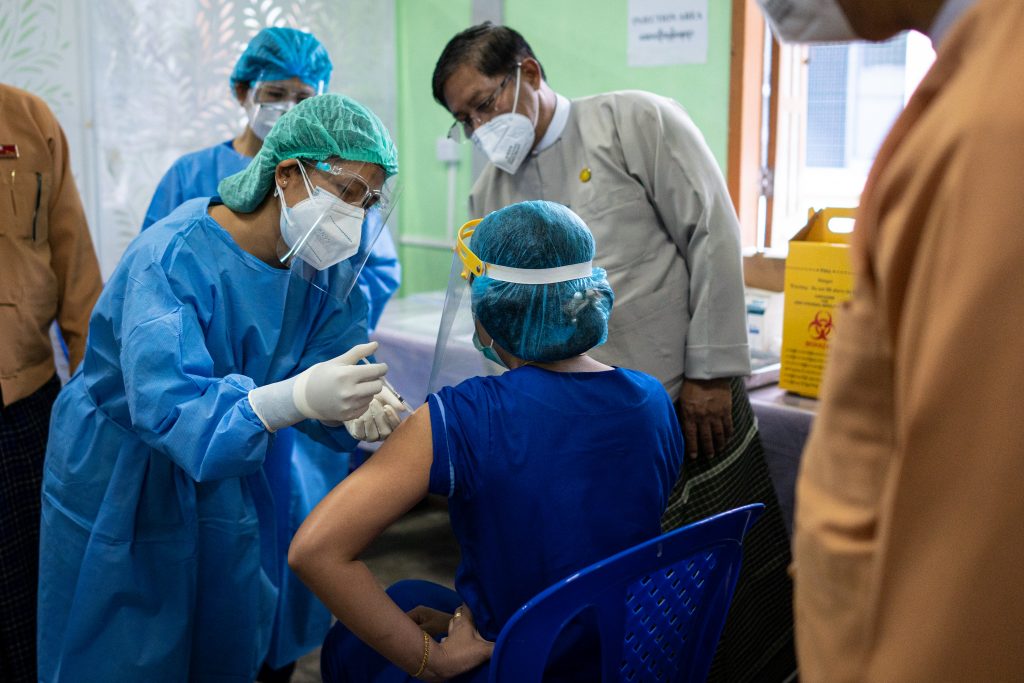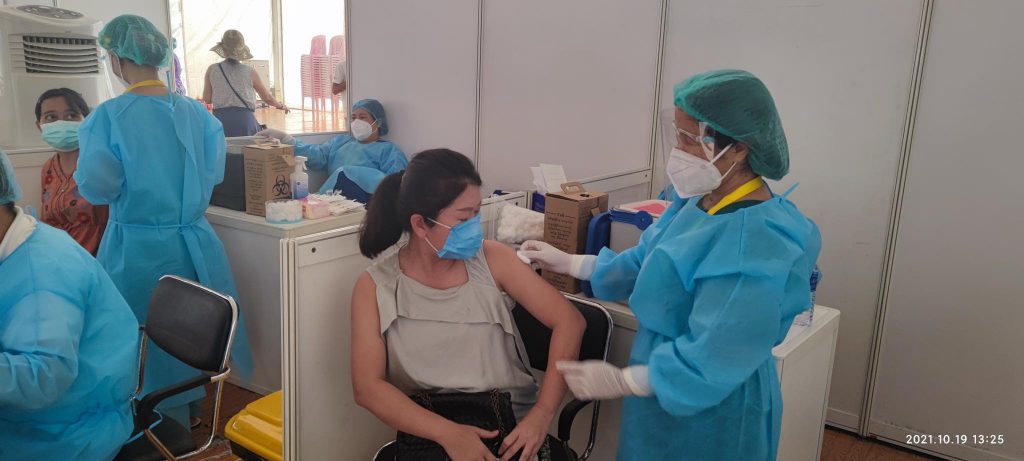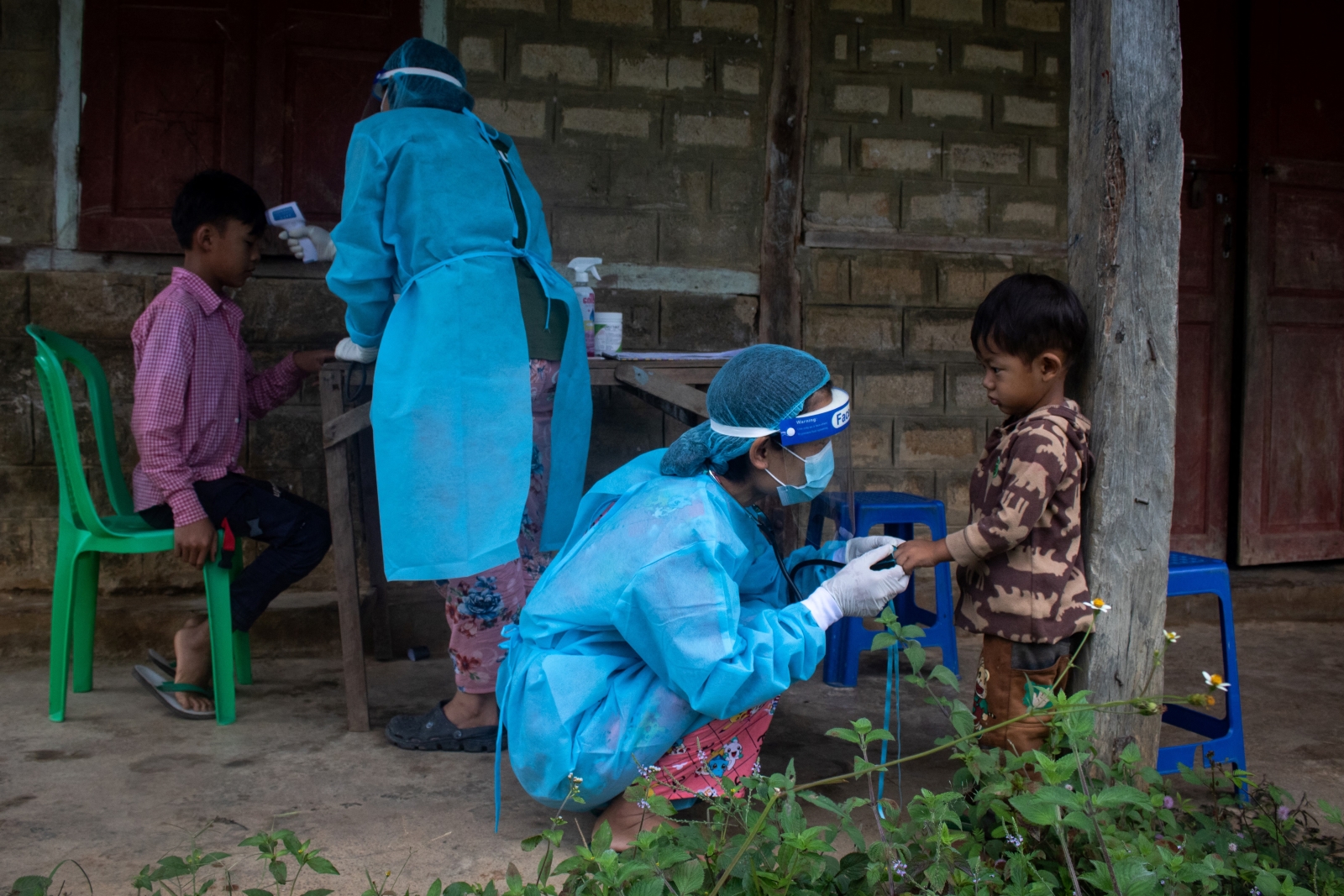Loathing of the military regime and distrust of China have wrought havoc with the national COVID-19 vaccination campaign, which launched just days before the coup.
By JOHN LIU | FRONTIER
Vaccine hesitancy has been holding back COVID-19 immunisation programmes in many countries around the world, leaving tens of millions of people vulnerable to the virus.
The reasons cited for refusing a jab are many: some claim COVID-19 isn’t real or its effects have been exaggerated, while others cite religious beliefs or have a longstanding opposition to vaccines. Some say they are fearful COVID-19 vaccines may have side effects that are not yet known because of the breakneck speed at which they were developed.
But for Yangon resident Ko Pyae Soe, a salesperson in his late 20s, refusing a jab from the military-controlled public health system is all about making a political statement against the February 1 coup d’état.
“I don’t want to legitimise [the junta’s] actions,” Pyae Soe said, adding that he knew many people who felt similarly, and would not take vaccines offered by the regime.
The National League for Democracy government toppled by the military began rolling out the country’s vaccination program just days before the coup, after acquiring 3.5 million jabs from India.
Pyae Soe said he was angry that after the coup the junta had distributed these vaccines as though it was the one that had procured them.
“They were not thankful that Aung San Suu Kyi got the vaccines,” he said. “They labelled her as a villain, but all of the people related to the military are getting the shots.”
Pyae Soe’s anger at the regime is also very personal: his mother died of COVID-19 in August, during the third wave of the pandemic. He blames the military for this, because the coup prompted tens of thousands of government health staff – doctors, nurses, midwives and specialists – to join the Civil Disobedience Movement and go on strike. When they tried to provide treatment to sick patients, they were often targeted by the regime.
“Because of their coup, there were not enough doctors for my mum,” Pyae Soe told Frontier on October 1. “I couldn’t even get her to another country for medical attention because they didn’t control the pandemic well, and most countries blocked entry [from Myanmar].”

The third wave capacity crisis
The COVID-19 third wave began in late June, and official figures show that daily new infections peaked around two weeks later at more than 7,000 cases. The real number was almost certainly far higher; on some days, more than 40 percent of tests came back positive, suggesting a huge number of missed cases.
Many patients with breathing difficulties were unable to get a bed in overflowing government hospitals, and instead had to receive treatment at home. Long lines formed at oxygen plants as people sought to fill cylinders so they could keep alive sick relatives.
As of November 16, Myanmar has recorded a COVID-19 death toll of 18,963, of which around 15,800 fatalities have been since February 1. About 800 new cases are being reported every day, along with close to 20 deaths.
Although the worst of the third wave appears to have passed, vaccination is seen as the key to reducing further hospitalisations and fatalities, particularly if and when another wave of the virus spreads.
However, Myanmar’s vaccination programme has lagged behind many countries. Among the 11 countries that make up the World Health Organization’s South-East Asia region, Myanmar is ahead of only North Korea.
According to the SAC’s Ministry of Health, as of November 11, 9.3 million people had been fully vaccinated and 5.1 million had received their first dose – a total of around 14.4 million people, including children above 12. The junta has set its vaccination drive target to half of the adult population, or about 18.5 million people, by the end of the year.
Anger at or lack of trust in the regime is perhaps the biggest reason for the slow pace of the rollout, but it’s not the only factor.
One public health expert who requested anonymity said the lack of health staff was an even bigger challenge initially. The expert said that although Myanmar achieved good progress with general immunisation programmes, the number of sites throughout the country where injections can be administered has plunged ten-fold since the coup, from about 12,000 to 1,200.
“It took a while for the [military] government to mobilise enough personnel because of the CDM,” the source said.
But distrust towards China, which is Myanmar’s main provider of vaccines and its defender on the United Nations Security Council, has also played a role.
Of the more than 40 million doses that the regime said it had received as of November 21, the overwhelming majority were purchased or donated by China. The rest have come mainly from India and Russia.
This was not the original plan. Under the NLD, Myanmar signed an order for 30 million doses of Covishield from the Serum Institute of India, but very few have been delivered. The Indian Embassy in Yangon declined to comment on whether the 30 million deal still stands.
The public health expert said Myanmar has also been offered a provisional allocation of more than 7 million doses of vaccines through COVAX, a mechanism that is supporting the provision of free vaccines to 92 low-and-middle-income countries. It is eligible for an additional 3 million COVAX doses for its vulnerable population, and these are due to be delivered in the coming months, the expert said.
In the meantime, Myanmar has little choice but to rely on China for vaccines. As of November 12, Myanamr’s northern neighbour had provided a total of 38.79 million doses of Sinovac and Sinopharm vaccines, according to the embassy in Yangon, of which 8.9 million doses were donated. The figure includes doses provided to both the regime and ethnic armed groups, but was not disaggregated.
To help prevent the spread of the highly infectious Delta variant to its territory, China has also supplied vaccines to armed groups that control territory in border areas, such as the Kachin Independence Army and the United Wa State Army.

Paying to avoid the regime
A limited amount of the Sinopharm vaccine is also available at clinics supplied by the Myanmar-Chinese Chamber of Commerce (MCCOC), at a cost of at least K50,000 (US$28) for two doses. The MCCOC is the national lobby of ethnic Chinese businesspeople and is headed by U Lin Wenmeng, owner of the Fu Xing Brothers Group of Companies, a diversified enterprise.
“We are the first non-government body in the world to import Sinopharm vaccines,” said a chamber spokesperson, stressing that the vaccination project was non-profit.
These Sinopharm vaccines have been distributed in Yangon, Mandalay and about 20 other cities throughout the country, and are targeted at members of the Chinese business community and their families, as well as Chinese nationals living in Myanmar.
Although they are not free, these vaccines have proven a popular option, particularly for those who object to receiving jabs from the regime. The chamber says it has completed its 700,000 Sinopharm-dose programme and is planning to import more.
More recently, others in the private sector have started importing COVID-19 vaccines. On November 18, Pun Hlaing Hospitals, owned by Singapore-listed Yoma Strategic Holdings, brought in Sinopharm vaccines directly from Beijing – the first batch of 400,000 doses that the company has received approval to import. It began inoculating patients at vaccination centres in Yangon, Mandalay, and Taunggyi in late November.
Yoma’s CEO Melvyn Pun told Frontier that the company’s vaccination programme would make vaccines available to a wider demographic than the MCCOC initiative, which he described as a “subsidised G-to-G arrangement”.
“That arrangement was limited to MCCOC partners and not for commercial use. We have therefore arranged with Sinopharm for a commercial importation of the vaccines that can be offered to the general public,” he said.
But Ko Paing, 30, who works in finance in Yangon, said he would never take a Chinese vaccine, even if it was imported privately and his employer paid for it.
“We boycott China because it is completely on the military’s side,” he said. “If my company provided India-made vaccines, I would accept them. We feel like China is providing vaccines or other COVID-19 relief in exchange for benefits from the military.”
Another reason people are more reluctant to receive Chinese made jabs is the perceived low efficacy, although the data on this is mixed. Clinical trials suggested that Sinovac was 51pc effective in preventing symptomatic disease, compared to 79pc for Sinopharm and 63pc for AstraZeneca, on which Covishield’s formula is based.
Ko Paing also echoed Pyae Soe’s comment about having “no trust” in the military. “He [Min Aung Hlaing] might inject us with water instead of vaccines and no one would know,” he said.
Public rejection of SAC-administered jabs and Chinese vaccines has led to a sharp increase in demand for India-made Covishield, and black market sales appear to be booming. Myanmar Now reported in late August, close to the peak of the third wave, that a vial of Covishield that normally sold for about K80,000 ($45) was fetching as much as K2 million ($1,114) on the black market.
“I know it is expensive, but I have no choice,” said a shop owner in Mandalay, who requested anonymity. He said he paid K280,000 ($155) for each person in his family of 12 to receive Covishield vaccines.
Competing campaigns
National Unity Government finance minister U Tin Tun Naing told the South China Morning Post in late September that the NUG was planning a $300 million vaccination campaign. He said this would cover about 11 million people living in areas that are not controlled by the SAC, but declined to provide further details on this population to Frontier.
He also claimed the NUG is expecting to receive four million doses of Pfizer vaccine and 2.2 million Sinovac doses under the COVAX facility, to be distributed and rolled out with international organisations. The minister subsequently told Frontier that he was unwilling to reveal the sources of the vaccines.
“Other than to say that there are only a few countries that have the capacity to manufacture and share effective vaccines and that we have an ongoing collaboration with countries which have a genuine interest in establishing a stable Myanmar,” he said.
But there are doubts that the NUG would be able to provide vaccines on anything like this scale.
The public health expert said that without facilities or control over significant territory, the NUG could find it difficult to roll out vaccines on its own.
“Without the approval of the current [military] rulers, it is difficult for anything to be mobilised in the country because there are no other channels,” they said. “For NUG, this is difficult because there are agreements that need to be signed.”
The expert explained that vaccine makers have to put indemnity and non-liability clauses into contracts to avoid being sued, due to the fact that the vaccines have been developed through an expedited process.
“All the facilities, all the cold chain, everything is in the hands of the current authorities,” they said. “In the case of Myanmar, who will sign this? … in most of the countries, it’s the government.”
If the NUG immunisation programme cannot be rolled out at a wide scale, there is a real prospect that many millions will remain unvaccinated by choice, rather than take a vaccine from the military-controlled health system.
One 26-year-old doctor who works at a private hospital in Mandalay said that as long as the military was overseeing the vaccine rollout the country would remain vulnerable to another deadly spike in cases. He estimated that 70pc of the population would refuse to accept a vaccine from the regime, although according to official figures 15 million people had already received at least one dose from the junta’s Ministry of Health as of November 20, including 10.4 million who were fully vaccinated.
“Vaccination is the most important strategy for preventing a new wave of COVID-19 and we are heading to a dead end unless we try to implement vaccination programmes that do not involve the junta,” the doctor said.
He said the junta should let the private sector, NGOs, or international agencies such as UNICEF and Gavi run the national vaccination programme instead.
“It’s not the people’s problem that they don’t trust the military junta, because it has proven in many ways since the coup that it cannot be trusted,” he said. “As a medical doctor, trust is fundamental in our profession. Building trust is actually one of the first things we try to do in a ‘doctor-patient relationship’.”
To the doctor, mismanagement from the power-hungry junta was the reason for the public health system’s downward spiral.
“CDM doctors run charity clinics, follow every instruction from the legally elected government, NUG, do what doctors should do to serve patients while the military junta kills, arrests and jails healthy and peaceful people of Myanmar,” he said.
“The answer is already so clear whose responsibility [it is], and why CDM started … If you want to blame someone, blame it all on Min Aung Hlaing.”
John Liu is a journalist who focuses on Myanmar’s politics and economy. He has written for Nikkei Asia, The Diplomat, Foreign Policy, Al Jazeera and other publications.







